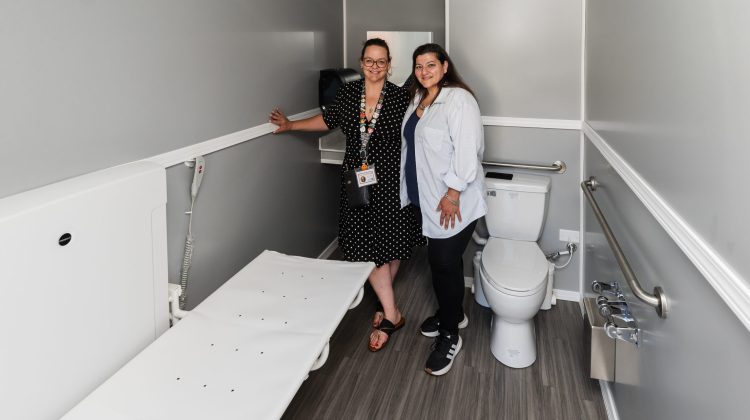LYNN — Two Lynn residents have invented an accessible mobile trailer designed to address structural barrier issues within the disability community.
“The Lynnebago” vehicle comes with an ADA-compliant bathroom space and a height-adjustable changing table. However, the prototype is more than just a comfortable portable potty. It also includes a sensory room for neurodiverse individuals and a multilingual communication panel with options such as a braille and sign language.
Oncology nurse Lisa Tulipani and entrepreneur Maria Riley founded The Lynnebago, which they described as a “community engagement hub.” As caregivers to family members with disabilities, the idea was inspired by listening to “eye-opening” experiences around Lynn.
“More people are speaking out now about what they need in comparison to 10-15 years ago. When we designed this concept, people were telling us how it would help people who are stuck at home and can’t get out. This includes young children, the elderly, parents with strollers, and those with temporary injuries,” Riley said.
“So we paid attention. We learned a lot about what people are looking for, and recognized the problem that most families have when they have individuals who have more complex situations than others,” she added.
The Lynnebago is meant to be held at a range of gatherings, from family movie nights to large festivals. It was created to encourage those with higher physical and/or mental support needs and their families to attend more communal events.
For example, those affected by mobility issues are often excluded from many gatherings, because they risk injury if they need to be changed in a regular bathroom. However, the Lynnebago allows for more dignity during this process.
Tulipani gave insight as to how systemic ableism creates a cycle of inaccessibility in many public spaces, especially in areas with older infrastructure like Lynn.
“You don’t see people with higher support needs out in society, so you forget they’re there. Therefore, it’s not a priority when you’re designing events and programs. So when you have the programs, they don’t show up, and you don’t see them,” Tulipani said.
“Who gets to participate in certain events is decided by who designs the spaces and programs. So if there isn’t a space for you, you create that space. Spaces that exist should allow everyone to exist,” she added.
The Lynnebago has collaborated with National Restroom Trailer, Merge Diverse Abilities Consulting, Collective Flow Consulting, and Northeast Arc. Emily Weltman, Founder of Collective Flow Consulting, explained why The Lynnebago was established as an LLC as opposed to a nonprofit organization.
“Caregivers are impacted economically. Why should their labor be a favor? One of the ways to help the disability community is to have them and their caregivers be compensated,” she said.
In 2023, The Lynnebago won Northeast Arc’s social innovation contest The Arc Tank, securing them a $75,000 grant. As for its future plans for growth, Tulipani and Riley are fundraising $150k to develop an operation procedure and a financial model that integrates community feedback and market data.
There is limited data on new disability inclusion innovations such as The Lynnebago, which creates challenges when it comes to securing funding. However, the team is centering their research around a primary question: How does enabling accessible community events that prioritize dignity and joy impact public health and economic growth?
“If you aren’t building ways for people to be represented, you are economically hindering them. People with disabilities and their families are valuable consumers that put money into the economy,” Weltman said.
“If people with disabilities and their families are not prevented from going out, they will likely stay at an event longer when they have access to amenities that allow them to create enjoyable memories,” Riley said.
“If people can have communal experiences, that will help mental health, which will help physical outcomes. Creating space for people to gather when normally they can’t is such a huge benefit,” Tulipani said.


